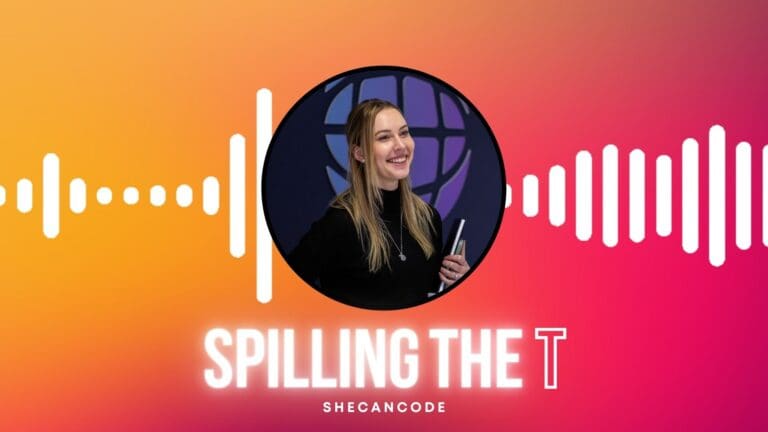MOVING INTO A HIGHLY TECHNICAL INDUSTRY CAN SEEM DIFFICULT AND INTIMIDATING, WITH MANY NOT KNOWING WHERE TO EVEN START.

Magda is an Associate Software Engineer in Brit. Presently, she’s working in backend development, creating applications that enable underwriting of complex risks. She first joined Brit as an intern, and previously completed the Code First Girls’ CFGDegree programme. Magda holds a master’s degree in Archaeology, and is passionate about interdisciplinary studies. She also enjoys painting and going for long walks in her spare time.
I WANT TO START WITH AN IMPORTANT FUNDAMENTAL DEVELOPING SOFTWARE IS NOT A MAGICAL SKILL – ANYONE CAN LEARN HOW TO DO IT.
It’s not always easy and requires a lot of hard work, but there are also a huge number of resources, and opportunities readily available. I went from a degree in Archaeology into a first job as a Software Developer – not the most natural path! Here are a few tips that may be helpful for those looking to start a career.
IS SOFTWARE DEVELOPMENT A CAREER FOR YOU?
Before you commit to switching careers, it’s good to research what your new role would involve. If there are any Software Developers among your friends and family, it might be a good idea to ask them about their job—what are the pros and cons, what sort of advice can they give? If you don’t know any Software Developers personally, you can also research online—look for articles and videos where Software Developers describe a day in their life. This kind of guidance is often facilitated through career acceleration: the power of mentorship and sponsorship.
At this early stage, I’d also recommend that you give coding a small try and see if you enjoy it – after all, if you decide on becoming a Software Developer you will be doing it quite a lot!
This research will help you get an idea of what to expect from the career transition, and how to start to prepare for any new challenges. It can also aid in picking out the right field to specialise in (this could be anything from Web Development, Mobile App Development, Game Development and many more).
LEARNING TO CODE
If your mind is set on pivoting to a career in software development, chances are that one of your biggest worries is learning how to code. A good way to start is to browse offers for jobs that you find interesting and identify the technologies and tools (i.e. “the techstack”) that they require the applicants to have experience with. These will usually be programming languages, like Python or JavaScript, as well specific frameworks or libraries for these languages, like Django or React.
Next, look for resources that will help you get acquainted with these technologies. Thankfully, the internet contains an enormous wealth of knowledge, from short articles right through to paid bootcamps. Popular platforms like Udemy or Coursera are good places to begin your learning.
Personally, I have greatly enjoyed using SoloLearn – a mobile application that delivers information in small, bite-sized pieces, ideal for learning when you’re stuck in commute or waiting for an appointment. Another great resource that I have taken advantage of a lot is on Youtube where you can find completely free tutorials that can take you through the process of building a small project from start to finish.
IDENTIFYING TRANSFERABLE SKILLS
Coding is not the only skill that a good Software Developer should have – soft skills and organisational skills are equally important. Think about your experiences so far and the skills you can leverage: maybe you’ve worked in customer service and learned how to communicate effectively? Maybe you’ve been a stay-at-home parent and have mastered multi-tasking?
In my case, working on archaeological digs was also relevant! It taught me about teamwork and working under time pressure, while the experience of documenting archaeological finds reinforced the importance and impact of good attention to detail. What’s more, studying Archaeology made me realise that I find fulfilment through learning new things – a trait that’s invaluable to anyone working in the fast-changing world of tech. Whatever your previous experience might be, chances are that you can find parts of it that would be an asset in a Software Developer career.
SETTING YOURSELF UP TO GET THAT FIRST JOB
If you’re a career switcher and don’t have a tech degree under your belt, finding your first job in Software Development might require a bit of patience.
To make up for your lack of experience, it might be a good addition to your CV if you decide to volunteer a portion of your time with a charity in a tech-support capacity, such as helping to build or maintain their website.
What is more, in lieu of a university diploma, many employers are happy to assess the level of an applicant’s skill based on a personal portfolio. These are usually hosted on a platform called GitHub. The projects that you decide to share can range in complexity: they can be as simple as five ways to reverse a string in your language of choice, to a simple website, a text-based game, or a sudoku solving script.
The golden ticket for pivoting into a Software Developer career is by taking part in a bootcamp or a program that guarantees either an internship or a full-time opportunity upon graduation. I’ve been lucky to have been accepted into Code First Girls’ CFGDegree course, and to have Brit Insurance sponsor my degree, as well as offer me a position upon my completion.
GET THAT FEAR OF FAILURE OUT OF YOUR SYSTEM
Switching careers can be a daunting prospect. If you’re well established within your existing career and want to switch to a new field, you might find it difficult to be back in a beginner position where you are likely to make mistakes. It’s important to remember that progress is rarely linear, and that there is no shame in being a novice. I see being a beginner as position of freedom – it’s a great privilege to be able to make mistakes and grow.
As a final piece of advice I’d offer this: when you finally land your first Software Developer job, don’t be afraid to ask questions and to take on new challenges, even when the solution to them is not clear to you at the outset. If you’re stuck or completely clueless, don’t be afraid to ask more experienced developers for help – at some point in their journey they will have been in your position, and had relied on others for help. And who knows, in a couple of years it might be you who is guiding another beginner in return.








